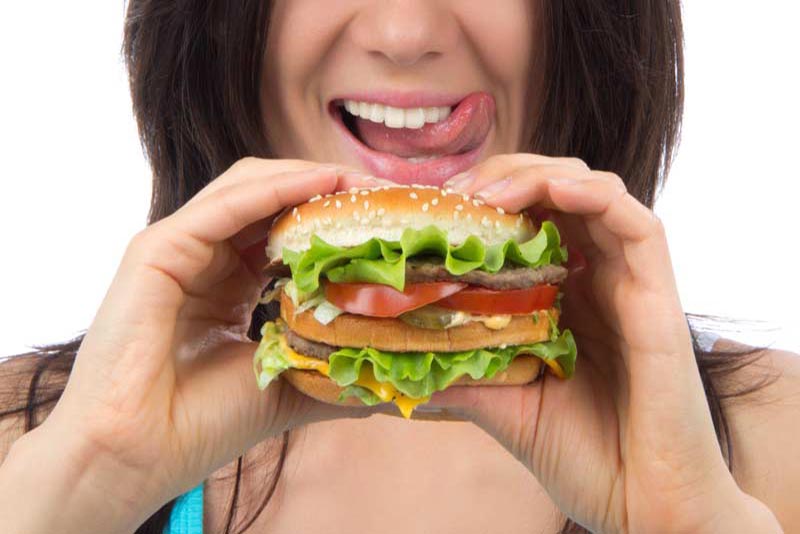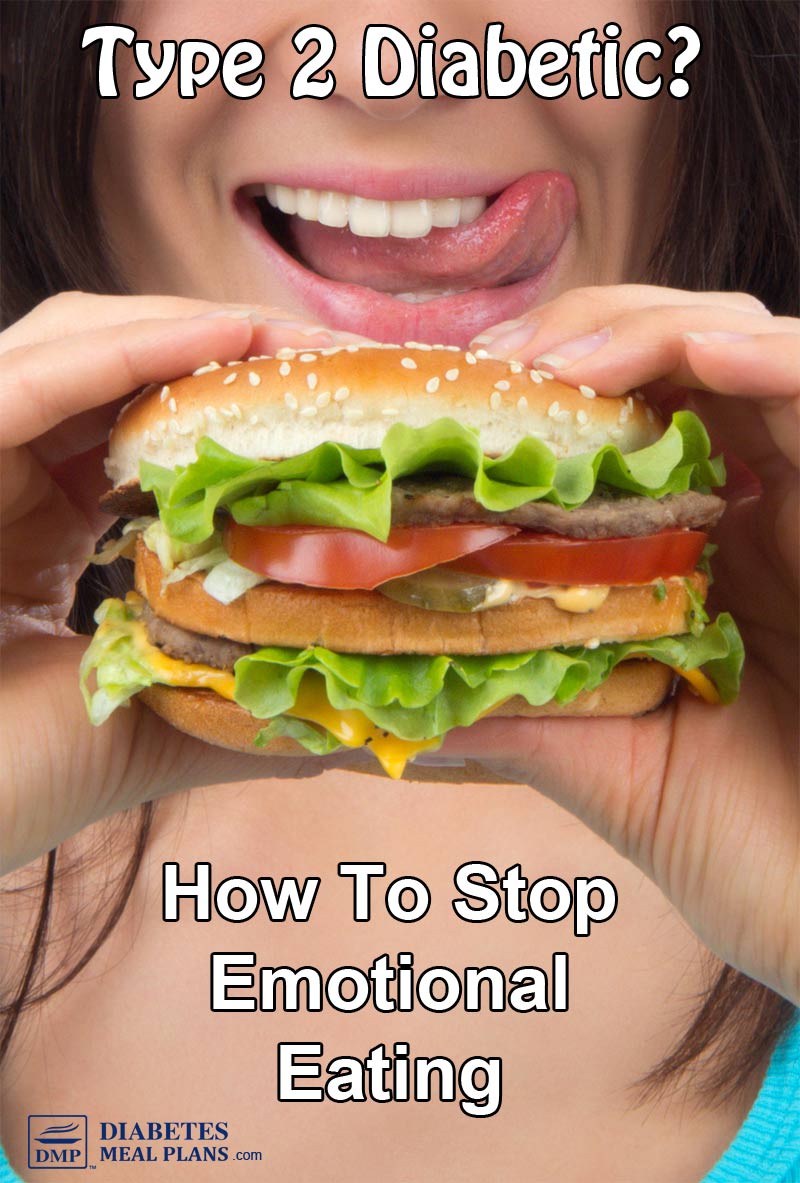Table of Contents[Hide][Show]
Is emotional eating a big problem for you?
Reaching for the ice cream and other sugar-filled treats to satisfy a moment of emotional hunger? Those food cravings that seemingly arise out of nowhere to see you chomping down on potato chips or any kind of junk food you can put your hands on?
If this sounds familiar, join the club – you’re not alone!
Food is a great human comfort for us all. And for that reason, emotional eating is common.
But with type 2 diabetes and prediabetes, you have other factors of your health to keep in mind – blood sugar levels and your weight.
So how do we stop emotional eating?
Here we explore some effective strategies.

Definition of Emotional Eating
There are different types of eating behaviors:
Emotional eating is when a person uses food to soothe themselves in some way. This is often situational and driven by an emotional trigger such as sadness, stress, or even a happiness event.
Overeating can be driven by emotional eating, or it can also be something a person does periodically, such as on vacation, at a family gathering such as Thanksgiving. We all overeat at times but it’s not necessarily a recurring behavior.
Binge eating disorder (BED) “is a severe, life-threatening, and treatable eating disorder characterized by recurrent episodes of eating large quantities of food (often very quickly and to the point of discomfort).” While emotional eating can drive a person to binge eat, a binge eating disorder and emotional binge eating are not necessarily the same. The key difference is the severity of the binge eating, along with the length of time a person engages in such an eating pattern.
If you’re binge eating to major discomfort levels, at least once a week for a period of 3 months or more, it is advised that you seek professional help. BED is a treatable disorder.
What Causes Emotional Eating?
Emotions
One of the causes is obviously emotions!
Emotional eating was traditionally thought of as being triggered only by negative emotions. And while negative emotions certainly are a stronger trigger, research now shows positive emotions can also trigger emotional eating in some people.
Think about how we associate food with positive feelings:
- We were rewarded with sweets and treats when we were “good” as children
- We celebrate by having a feast
- We socialize with food
- And so forth
These associations make food a comforting experience to our deepest inner desires.
In terms of negative feelings, common triggers can be:
- Sadness
- Depression
- Boredom
- Pressure
- Stress
- Overwhelm
- And any other kind of difficult emotion
Emotional eating is not healthy for either your body (because we often choose unhealthy foods) or mind, and can lead to:
- Weight gain or difficulty with weight loss
- Binge eating
- Feelings of guilt
- Depression
- More emotional eating
Rather than being conscious of emotions, many of us have ‘autopilot’ reactions to them, reacting with behaviors that are not-so-good for us, like the ones outlined above. We’re also not really given the skills to deal with emotions effectively.
The good news is, with a little effort on our part, we can overcome our ‘autopilot’ habits and reprogram the way we react to emotions.
Altered Food Cues and Hormones
Researchers suggest some emotional eaters have altered food cues.
Aside from our choices, we also have various hormones that regulate our appetite and hunger signals.
These hormones include:
- Insulin – the blood sugar/ metabolic regulating hormone
- Ghrelin – the hunger signalling hormone
- Leptin – the appetite regulation hormone
- Glucagon-like peptide-1 – a hormone triggered from the gut post-meal that helps regulate food behavior by signalling satiety (a feeling of fullness)
This is too complex to explore right now, but changes in your metabolism, such as obesity, prediabetes or type 2 diabetes, can alter the way hormones work and interfere with your food cues.
Stress and Emotional Eating
Stress is a major trigger of emotional eating patterns.
In fact, according to the American Psychological Association, the stats for stress eating are high:
- 38% of adults report overeating unhealthy foods in the past month
- 49% of those same people do it weekly or more
- 33% say they do it because it’s a distraction from their stress
- 27% say they do it to manage their stress
- 34% say it’s a habitual response to stress
After engaging in stress eating:
- 49% of adults report feeling disappointed in themselves
- 46% report feeling bad about their bodies
- 36% feel sluggish or lazy
- 22% report being irritable
Cortisol (our stress hormone) has a rapid feedback loop to the brain and pituitary gland. And this feedback, this communication, is what affects metabolism, the nervous system, processes associated with reproduction, inflammation, fat storage, and eating behaviors.
Elevated cortisol also drives cravings for high fat and high sugar foods. And elevated cortisol promotes fat storage around the midsection, too – so with stress-driven emotional eating, you can find yourself in a vicious cycle of overeating and weight gain.
As Dr Robert Lustig says, it is not just your willpower driving behaviors, it’s your biochemistry, because the biochemistry drives the behavior.
Dr. Robert Lustig has a fantastic 7-part series of YouTube videos that explore obesity and type 2 diabetes and the relationship to biochemistry – it’s very interesting and well worth watching.
Practical tips to Stop Emotional Eating
Don’t ‘diet’
Going on a ‘diet’ is notoriously known to induce feelings of deprivation, which can lead to emotional eating behaviors.
With all the weight loss diet fads we’re subjected to, the word ‘diet’ does have a bad association. But the word ‘diet’ simply refers to your daily eating habits. So instead of going on a ‘diet,’ choose a ‘a way of eat’ that you can enjoy long term.
With diabetes, there are obviously some changes that need to occur with your diet that may at first make you feel slightly deprived (such as cutting pasta and potatoes), however, it’s just a matter of learning the alternatives – and there are plenty!
TESTIMONIAL: “I’m feeling very upbeat and positive about my eating habits being modified and changed without feeling deprived or like a victim.” ~Sandra T, 30 Day Turnaround Program.
Focus on what you CAN have
Having to limit certain carbohydrate foods that are much-loved (potatoes, rice, pasta, bread, noodles), can at first impose a sense of restriction. You can feel like there is nothing left to eat and that your life is doomed. This in itself can lead to emotional eating and binge eating behaviors.
We understand it can be challenging at first. But one of the main issues here is that you’ve known no other way of eating. That’s what our website and services (like providing a weekly meal plan) are all about, we help you enjoy life more while regulating blood sugar and A1c at the same time – and it’s all through showing you a way of eating you can sustain over the long term.
There is still plenty of food you can eat with diabetes and keep blood sugar levels in a healthy range, so focus on what you can have (see this food list) and learn how to incorporate that into a way of eating that you thoroughly enjoy.
Please pin, share or tweet; then keep on reading.

Deal with Emotions Differently
Instead of reaching for food, apply a new reaction/behavior, such as,
- go for a walk
- have a bath
- confide in a friend
- communicate to resolve issues with people
Clean out the pantry
Don’t keep your go-to binge foods anywhere in sight.
Clear out your kitchen cabinet and pantry of all the ‘naughty’ items that you’d commonly reach for. Instead, have alternative options to choose from.
Listen to your Body
Before reaching for food, ask yourself: Am I really hungry?
Oftentimes we don’t actually have physical hunger but are simply reacting to an emotion or desiring a flavor or taste sensation.
Mindfulness Meditation
Fifty years ago, nearly all foods were planned and consumed in the home, together in community with family and friends. People ate 3 balanced meals each day and the option to graze and snack all hours of the day and night were not available.
Now it’s estimated that over 40% of the food we eat is away from home–that means in a restaurant, at our desks, in our cars–which means, a lot of the time we’re not a fully aware of our emotions or listening to our bodies.
Research shows one effective way to treat emotional eating (and binge eating) is to engage in some kind of mindfulness meditation or practice, to help bring your attention into the moment.
According to Psychology Today: “Mindful eating involves paying full attention to the experience of eating and drinking, both inside and outside the body. We pay attention to the colors, smells, textures, flavors, temperatures, and even the sounds (crunch!) of our food. We pay attention to the experience of the body.“
It involves being 100% present with the eating experience. Not trying to do a million other things at the same time.
A Mindful Eating Exercise
Sit down at the table to eat and before you start eating look at your food. Notice it’s colors and textures.
Smell the aromas. Be grateful for the food because we are blessed to live in parts of the world where we have access to such abundance of good food.
Then start eating your food slowly.
Be conscious of the flavor and texture on your tongue and in your mouth.
Chew your food thoroughly and notice your feelings and thoughts about the process.
Try and do this regularly over a one week period and notice some of the differences in your behaviors or thoughts around food.
What changes do you notice?
Does it make you feel fuller? Do you eat less food when you practice mindful eating? Are you enjoying the food more? Have you noticed any changes in your eating habits? Have you stopped binging at night?
It’s amazing what can happen when we are fully engaged in the process of eating and sometimes this simple exercise can bring extraordinary results!
Get professional help
Don’t be ashamed or embarrassed about having an emotional eating problem, many of us do. And if you struggle to overcome your emotional eating or any other kind of eating behavior, you may need some help.
Consider working with a nutritionist to design a meal plan that works specifically for you, or go talk to a counsellor or psychologist who can give you some effective tools and techniques to overcome your specific problems.
Conclusion
It can be a challenge to overcome emotional eating. And often it’s a thing that we’ll have to fight against for sometime, constantly pulling ourselves out of old behavioral patterns and into new ones.
Give the above strategies a try. There is no one best solution, but it’s a matter of trying strategies and discovering what works best for you.


Leave a Reply